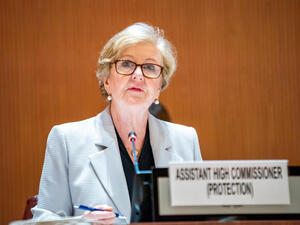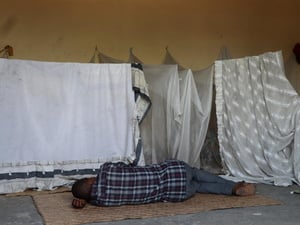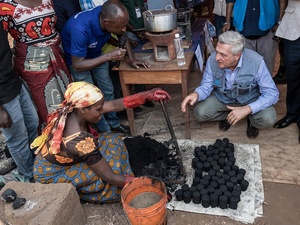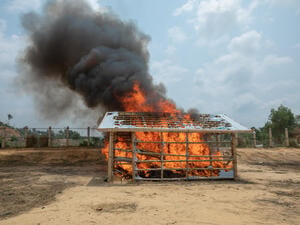UN refugee head says global compact is chance to chart a different course
UN refugee head says global compact is chance to chart a different course

A Rohingya father carries his children through a paddy field near the Anjuman Para crossing point on the Bangladesh-Myanmar border.
GENEVA – One year on from the world pledging to work together to improve its response to refugee situations, the tragedy of forced displacement remains a global challenge which must be overcome, the head of UNHCR, the UN Refugee Agency, declared today.
Opening a key meeting in Geneva on a new global compact for refugees, Filippo Grandi noted that throughout the world people were still having to flee their homes, victims of a collective failure by the international community to prevent and resolve conflicts.
“While conflict and violence continue to force people to abandon their homes, those same failures of international cooperation that we observed continue to block access to solutions and in different ways to undermine international protection elsewhere. The result, for all of us to see, is State-by-State responses, as opposed to cooperative ones,” the UN High Commissioner for Refugees said.
"There are many challenges, that we are all familiar with. It would be easy, in such a climate, to say ‘it’s impossible’ – but we cannot, and we have chosen to confront these challenges, and to take these up," he added.
Grandi was delivering the opening address to the High Commissioner’s 10th Dialogue on Protection Challenges, which takes place from 12-13 December.
The meeting will primarily take stock of the results of consultations that have taken place since 193 member states of the United Nations in 2016 adopted the New York Declaration committing members to better share responsibility for the world’s refugees and support the communities that host them in a global compact. This included drawing up a Comprehensive Refugee Response Framework (CRRF).
"The New York Declaration emerged from the Syria refugee crisis – or rather the failure to address some of the challenges of this crisis. But the challenges go well beyond the Syria refugee situation – this is a global problem," Grandi told the opening session.
Calling for the compact to change the way the international community engages with refugee issues, Grandi maintains that a failure of international cooperation has undermined protection for those fleeing conflict and persecution in the form of closed borders, restricted access, and the politicization of refugee and migration issues.
"We want to propose a global compact on refugees which can help to overcome some of these failures, and serve as a concrete, usable instrument for international cooperation, rooted in practical, operational engagement. It can and must stand on its own, even if or when political attention waxes and wanes," he added.

Filippo Grandi, United Nations High Commissioner for Refugees during High Commissioner's Dialogue on Protection Challenges.
"The New York Declaration gave UNHCR... a very important responsibility: to make those commitments practical, predictable and sustainable; and to distance them from – and avoid making them hostage to – volatile politics. This is fundamentally what the global compact hopes to achieve," he declared. "It should consist of a set of workable measures, but also be a “rallying point”, a point of reference for refugee protection."
Grandi said the New York Declaration was a milestone giving refugee situations high political visibility and commitment and an important reaffirmation of fundamental humanitarian values.
"We want the global compact to chart a different course."
"At a time when multilateralism is under great pressure, and often neglected, put aside and criticized as inefficient, we want the global compact on refugees to chart a different course – through concrete engagement, but also cooperation based on shared values.
He termed the five thematic discussions, held between July and November 2017, as “positive, forward-looking and full of ideas” and concluded by saying:
"I hope that we will not forget the fundamental objective of the global compact on refugees – to have a real impact on people’s lives. This includes citizens of host communities who sacrifice so much to host refugees; as well as refugees so that they can contribute and not be a burden on host communities – so that both refugees and host communities remain strong and resilient in adversity, until solutions are found."
Some 500 representatives from governments, local authorities, civil society, the private sector, academics, international organisations and financial institutions, and refugee youth delegates from around the world are expected to attend the talks.
Uganda was the first country that decided to apply the CRRF once the New York Declaration was adopted. Addressing the forum in Geneva, Deputy Permanent Representative Benedict Lawrence Lukwiya highlighted how its refugee policy “has endured the pressure of a continuing influx” of more than 1 million refugees.
“This is because the government recognized early enough the need to go beyond refugee protection and emergency relief, to begin to address the longer-term development needs. Secondly the government also recognized that the humanitarian response also needs to be supported if we are to ensure effective delivery and concrete results in subsequent areas of our refugee hosting responsibilities.
“Uganda’s refugee coordination model and refugee response plan focused on solutions right from the onset of the refugee influx as well as life-saving interventions and environmental protection. Success in these areas is being supported by the policy of integrated service delivery support for host communities and inclusion of refugees in government planning.”
Lukwiya concluded with an appeal to all donors and stakeholders to follow through on their pledges to begin to fulfil the “burden sharing objectives that we have set ourselves in the New York Declaration. And this should also include third country resettlement opportunities for refugees in Uganda.”
The global compact on refugees will build on the existing international framework for refugee protection, including the 1951 Refugee Convention, and aims to share more equitably the responsibility for hosting the world’s refugees and to help them rebuild their lives.
It will set out concrete steps to be taken by governments and others to ensure communities hosting refugees get the timely support they need, that refugees are better included in host communities (with access to health, education, livelihoods), and that solutions to the plight of refugees are sought from the start of a refugee situation.
UNHCR will begin formal consultations on the compact with governments and other stakeholders in February 2018. The High Commissioner will propose a compact to the UN General Assembly towards the end of 2018.










